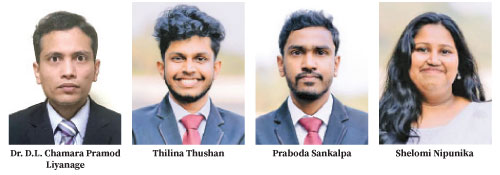In Sri Lanka’s growing vehicle market, transparency, trust, and safety are critical. Yet, the current centralised vehicle record system continues to struggle with outdated processes, fraudulent ownership documents, and a lack of reliable service histories. These challenges not only slow down the efficiency of institutions like the Department of Motor Traffic (DMT) but also leave everyday citizens vulnerable, especially in the second-hand vehicle market.
 To address these long-standing gaps, a new intelligent system has been introduced, which is built by integrating technologies like blockchain, Machine Learning (ML) and Artificial Intelligence (AI). This solution offers a secure and decentralised platform to manage vehicle data while integrating machine learning (ML) to predict mechanical faults before they occur. Its design leverages cutting-edge technologies and real-world use cases, offering a vision of what national-level digital transformation in the transport sector could look like.
To address these long-standing gaps, a new intelligent system has been introduced, which is built by integrating technologies like blockchain, Machine Learning (ML) and Artificial Intelligence (AI). This solution offers a secure and decentralised platform to manage vehicle data while integrating machine learning (ML) to predict mechanical faults before they occur. Its design leverages cutting-edge technologies and real-world use cases, offering a vision of what national-level digital transformation in the transport sector could look like.
From Centralised Challenges to Decentralised Solutions
The existing vehicle record management in Sri Lanka is largely paper-based or reliant on separate databases, which makes it prone to data loss, data manipulation, fake documents, and delays in vehicle registration processes.
It also lacks the ability to forecast potential mechanical issues, often resulting in unexpected breakdowns or untrustworthy vehicle histories for buyers.
The new system uses Hyperledger Fabric, a permissioned blockchain platform, to decentralise and secure the entire vehicle record lifecycle.
All registration details including Registration Number, Chassis Number, Engine Number, Class of vehicle, etc are recorded immutably on the blockchain. This ensures that once data is entered, it cannot be altered or deleted, thereby preventing unauthorised modifications and fraud.
Each transaction, whether it’s a new registration or vehicle ownership transfer, is validated through smart contracts, ensuring that the process is both automated and tamper-proof. This significantly reduces the reliance on intermediaries or paper-based verification processes.
Document Integrity through Decentralised Storage
Vehicle related documents such as registration certificates are uploaded via the system’s user interface and stored using IPFS (InterPlanetary File System), a peer-to-peer file storage protocol. IPFS generates a unique cryptographic hash for every document, which is then recorded on the blockchain.
This hybrid approach ensures both scalability and trust.
Instead of storing bulky documents on the blockchain, the system only stores the content hashes, which can later be used to verify that the document has not been altered. It also enables faster access to documents by various authorised parties, including service centres, insurance providers, and regulatory institutions.
Predicting Faults
Beyond secure record management, the system introduces predictive maintenance capabilities powered by Machine Learning (ML). A specially designed dataset of 100,000 simulated service records was used to train a Random Forest algorithm to identify fault patterns across key components such as engines, brakes, transmissions, and tyres.
Once the data is pre-processed (cleaned, normalised, and encoded), the model can detect multiple potential faults in a vehicle even before they become visible. By analysing essential vehicle data, service history, and emission test inputs such as mileage, fuel type, engine emissions, and maintenance frequency, the system predicts whether a vehicle may experience issues such as tyre and alignment faults, engine faults, electrical system faults, brake faults, transmission faults, air conditioning faults, or coolant and air filter faults. To enhance usability, these predictions are passed through an AI model that translates technical outputs into clear, human-readable suggestions. Instead of presenting users with complex data or probabilities, the system provides an easy-to-understand prediction report, helping users quickly identify potential issues. This approach empowers both vehicle owners and potential buyers to make informed, preventive decisions.
Web-Based Access and Stakeholder Integration
 The system is accessed through the Motora web application. Stakeholders such as the DMT, divisional secretariat, emission test centres, insurance companies, service centres, and vehicle buyers can log in securely, view or update verified records, and access AI-driven fault predictions in real-time.
The system is accessed through the Motora web application. Stakeholders such as the DMT, divisional secretariat, emission test centres, insurance companies, service centres, and vehicle buyers can log in securely, view or update verified records, and access AI-driven fault predictions in real-time.
Security is enhanced through integration with MetaMask, a browser based digital wallet that manages blockchain credentials and ensures verified transactions. The backend system handles business logic and secure API calls, while the frontend offers a streamlined, user-friendly experience.
National Significance and Future Outlook
With the growing vehicle market in Sri Lanka, the need for a trustworthy, digitised, and intelligent record system has never been greater. This system provides a ready to implement model for digital governance in the transport sector.
By supporting proactive maintenance, reducing fraud in the second-hand vehicle market, and enabling seamless collaboration among institutions, the platform also aligns with broader goals of smart cities, digital government services, and environmental sustainability. Successfully scaling this solution will require active support from the Department of Motor Traffic, along with integration into existing government systems.
In conclusion, this system represents more than just a technological upgrade. It lays the foundation for a safer, smarter, and more transparent future in Sri Lanka’s transportation ecosystem.
By:
Dr. D.L. Chamara Pramod Liyanage, Mr. Thilina Thushan,
Mr. Praboda Sankalpa,
Miss. Shelomi Nipunika
Faculty of Technology, University of Sri Jayewardenepura, Sri Lanka.







